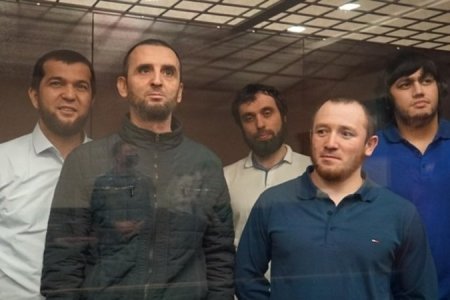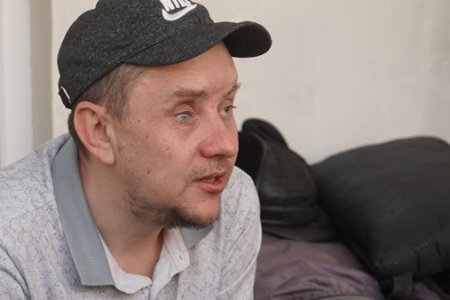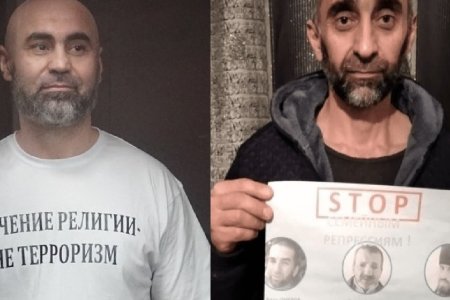
A Russian ‘court’ notorious for conveyor belt ‘trials’ of Ukrainian political prisoners has passed 14- and 15-year sentences against five Crimean Tatars, all of them activists for the Crimean Solidarity human rights group whose release has been demanded by the UN General Assembly and other international structures. The men were not accused of any actual crime and the judges did not just ignore the lack of evidence, but positively obstructed the defence when the latter asked questions demonstrating that the prosecution’s ‘anonymous witnesses’ did not even know the defendants.
The sentences were announced in the Southern District Military Court in Rostov (Russia) on 18 March, and were, in all cases just one year less than those demanded by Russian prosecutor Sergei Aidinov.
Eskender Suleimanov (b. 1973), a technical engineer, and Asan Yanikov (b. 1986) were both sentenced to 15 years’ imprisonment. Akim Bekirov (b. 1988), an IT security specialist; Seitveli Seitabdiev (b. 1994), a civic activist; and Rustem Seitkhalilov (b. 1984), a carpenter received 14-year sentences. All of these terms of imprisonment are in the worst of Russian penitentiary institutions, with the first five years in a prison, the absolute worst. Each sentence included a further one year restriction of liberty after the men’s release.
These sentences are significantly higher than Russian courts pass in the case of crimes of violence, yet were imposed on law-abiding members of society who were not accused either of committing a recognizable crime, or even of planning one.
The men were accused only of ‘involvement’ in the Hizb ut-Tahrir movement, a peaceful transnational Muslim political and religious organization which is legal in Ukraine and which is not known to have carried out acts of terrorism anywhere in the world. Russia has never provided any grounds for its highly secretive 2003 Supreme Court ruling that declared Hizb ut-Tahrir ‘terrorist’, yet this inexplicable ruling is now being used as justification for huge sentences on supposed ‘terrorism charges’ under Article 205.5 § 2 of Russia’s criminal code. The country which invaded and annexed the men’s homeland also charged them, under Article 278, with “planning a violent seizure of power and change in Russia’s constitutional order”. Not one of the armed searches of the men’s homes had found any weapons, nor indeed had the FSB even pretended to look for anything but so-called ‘prohibited literature’.
Russia’s Hizb ut-Tahrir prosecutions are known, both in Russia and in occupied Crimea, to provide promotion or bonuses for the FSB involved in them, and enable the latter to improve their statistics on ‘catching terrorists’ without putting themselves out in any way.
The situation is even worse, however, in occupied Crimea where Russia has systematically used such charges as a weapon to try to crush the Crimean Tatar human rights movement, in particular Crimean Solidarity. The latter emerged in 2016, in response to the mounting number of political prisoners under Russian occupation. Crimean Solidarity activists and journalists play a hugely important role in helping political prisoners and their families, and in ensuring that other Crimeans, and the international community learn about the human rights violations that Russian is committing.
Russia began persecuting Crimean Solidarity activists in 2017, however it was the mass ‘operation’, mainly on 27 March 2019 that finally elicited outrage from the international community. There were demands for the men’s release, from, among others, the US State Department, Human Rights Watch, Freedom House and Civil Rights Defenders. The Memorial Human Rights Centre was swift to recognize all of the arrested men as political prisoners and condemned the case as an attempt to crush the Crimean Tatar human rights movement. All of these prosecutions are also in breach of international law since Russia is an occupying state which is prohibited from applying its legislation in Crimea and forcibly taking Crimeans to Russia.
It is likely that one of Russia’s motives in splitting the case of the 25 Crimean Tatar civic journalists and activists into five identical clone trials was to minimise international attention. It was much harder to follow each of the ‘trials’ and to compare the already contradictory testimony given by the ‘anonymous witnesses’ in one trial against another.
As well as the fundamental flaws in the charges, there was also simply no real evidence. This is despite the fact that no evidence is required of terrorism, only of ‘involvement’ in Hizb ut-Tahrir.
Russia is increasingly using ‘prohibited literature’ that the FSB often plant during the armed searches which the men’s lawyers are invariably prevented from attending.
The charges mostly hinge on illicitly taped conversations from 2016 during which the 25 men discussed religious, political and other, entirely innocuous, subjects. Transcripts of the scarcely audible conversations were sent to FSB-loyal ‘experts’ who essentially provided the assessments demanded of them. The defence were able to provide an expert assessment which found that the tapes had been tampered with, yet this was ignored by the court, as was an independent religious specialist’s damning assessment of the primitive mistakes made by the supposed religious expert, Mukhammed Zaripov.
The second component part of these prosecutions is their reliance on anonymous witnesses whose testimony cannot be verified and who may well not even know the defendants. These were several such ‘witnesses’ in these ‘trials’, including one whose testimony was shown to have changed in accordance with the change in the indictment with respect to one of the defendants. Russia was recently criticized in the UN Secretary General’s report on occupied Crimea for convictions based almost exclusively on anonymous testimony, with the Secretary General also noting the dubious role played by the court in preventing exposure of flaws in such ‘testimony’. There is no reason for keeping any ‘witnesses’’ identity secret and there is very strong evidence that men are being tortured or threatened with imprisonment if they do not agree to ‘cooperate’ with the prosecution.
There is simply no possibility that presiding judge Aleksandr Generalov, together with Dmitry Merkulov and Aleksei Sannikov were not aware that they were passing fundamentally flawed and unjust sentences.
Three of the men have small children, with Akim Bekirov’s second child, a son, born a few months after his arrest. One of the most brutal parts of these prosecutions is that Russia often targets several members of the same family. The parents of Eskender Suleimanov, and his civic journalist brother Ruslan Suleimanov face never seeing their sons again if these horrific sentences come into force. Server and Zera Suleimanov were home when the FSB came for Eskender, their elder son. When Zera Suleimanova became distraught and shouted at the armed and masked men, one of them pulled out his gun and pointed it at her. “Shoot me”, she said, adding that she might as well die now that they were taking her sons from her. “We’ll have time to shoot you all”, she was told.
PLEASE WRITE TO THE MEN!
The sentences will be challenged and the men are likely to remain imprisoned in Rostov until the appeals are heard. Letters tell them they are not forgotten and show Moscow that the ‘trial’ now underway is being followed.
Letters need to be in Russian, and on ‘safe’ subjects. If that is a problem, use the sample letter below (copying it by hand), perhaps adding a picture or photo. Do add a return address so that the men can answer.
The addresses below can be written in either Russian or in English transcription. The particular addressee’s name and year of birth need to be given.
Sample letter
Привет,
Желаю Вам здоровья, мужества и терпения, надеюсь на скорое освобождение. Простите, что мало пишу – мне трудно писать по-русски, но мы все о Вас помним.
[Hi. I wish you good health, courage and patience and hope that you will soon be released. I’m sorry that this letter is short – it’s hard for me to write in Russian., but you are not forgotten. ]
Akim Bekirov
344022, Россия, Ростов-на-Дону, ул. Максима Горького, 219 СИЗО-1.
Бекирову, Акиму Экремовичу г.р. 1988
[In English: 344022 Russian Federation, Rostov on the Don, 219 Maxim Gorky St, SIZO-1
Bekirov, Akim Ekremovich , b. 1988 ]
Seitveli Seitabdiev
344022, Россия, Ростов-на-Дону, ул. Максима Горького, 219 СИЗО-1.
Сейтабдиеву, Сейтвели Эскендеровичу г.р. 1994
[In English: 344022 Russian Federation, Rostov on the Don, 219 Maxim Gorky St, SIZO-1
Seitabdiev, Seitveli Eskenderovich, b. 1994
Rustem Seitkhalilov
344022, Россия, Ростов-на-Дону, ул. Максима Горького, 219 СИЗО-1.
Сейтхалилову, Рустему Наримановичу, г.р. 1984
[In English: 344022 Russian Federation, Rostov on the Don, 219 Maxim Gorky St, SIZO-1
Seitkhalilov, Rustem Narimanovich, b. 1984
Eskender Suleimanov
344022, Россия, Ростов-на-Дону, ул. Максима Горького, 219 СИЗО-1.
Сулейманову, Эскендеру Серверовичу, г.р. 1973
[In English: 344022 Russian Federation, Rostov on the Don, 219 Maxim Gorky St, SIZO-1
Suleimanov, Eskender Serverovich, b. 1973
Asan Yanikov
344022, Россия, Ростов-на-Дону, ул. Максима Горького, 219 СИЗО-1.
Яникову, Асану Алиевичу, г.р. 1986
[In English: 344022 Russian Federation, Rostov on the Don, 219 Maxim Gorky St, SIZO-1
Yanikov, Asan Alievich, b. 1986 ]



